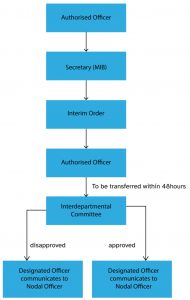 India is ranked as the third highest contributor (after U.S. and Russia) of visits to content piracy websites with over 7 Billion+ (7,99,071,291) visits through torrent sites according to a study released in February by Ankura Consulting Group LLC.
India is ranked as the third highest contributor (after U.S. and Russia) of visits to content piracy websites with over 7 Billion+ (7,99,071,291) visits through torrent sites according to a study released in February by Ankura Consulting Group LLC.
Government is well-intentioned but there are gaps that surely must interfere with reporting and enforcement against pirates.
The highest rate was for TV content, accounting for 46.8% of all traffic to piracy websites. Film piracy was third, at 12.40%. The report’s data set measured industry-wide traffic and piracy demand for the film, TV, music, software, and publishing sectors across unlicensed streaming, torrent download, web download, and stream-ripping websites, said Ankura.
More than 60% of global online piracy is attributable to illegal streaming services, while illegal downloading of copyrighted materials takes up 24%. Pirated video material gets over 230 billion views a year. Annual global revenue losses from digital piracy are between $40 and $97.1 billion in the movie industry, according to Ankura.
Anti-piracy successes
Indian regulators put site blocking guideline in place years ago and they have brought results. During 2021 and 2022, India’s Ministry of Information and Broadcasting issued directions to block 78 YouTube based news channels and their social media accounts for public access for violation of Section 69A of Information Technology Act, 2000. India’s Ministry of electronics and Information Technology (MEITY) blocked 560 YouTube URLs during that period.
A report released in January 2023 by India’s Software Freedom Law Centre (SFLC), called Finding 404: A Report on Website Blocking in India, said that since 2015, India has blocked more than 55,000 Web sites, of which about 26,000 were blocked under Section 69A for copyright violation. The rest were blocked for spreading disinformation and for public harm.
Regulation to combat piracy
To combat piracy, the Indian government began to actively put initiatives in place in 2020, which are assigned to India’s Department of Promotion of Industry and Internal Trade, Ministry of Commerce & Industry. India’s National IPR Policy, introduced in 2016, contains objectives for IPR protection, penalty guidelines for the illegal duplication of films, and provides guidance for collaboration between law enforcement, government, and the court system.
Governmental challenges
A January article by the World Intellectual Property Organization (WIPO) by two executives of the Global Enforcement team for the Alliance for Creativity and Entertainment (ACE) detailed some of the challenges facing anti-piracy efforts in India. The national government runs a National Malware Repository and the Indian Cyber Crime Coordination Centre (I4C), which includes a National Cyber Crime Reporting Portal, where cases of piracy — with or without a malware nexus — may be reported, according to Lieutenant-General Rajesh Pant, a military cybersecurity expert advising the Indian government as National Cyber Security Coordinator (NCSC). He added that piracy and malware attacks were separately punishable under the Copyright Act 1957 and the Information Technology Act 2000.
But the administrative side of the take-down process has many steps:

According to the SFLC report, site blocking recommendations are “sent to the Secretary of Ministry for interim approval or disapproval. Pertinently, such measures can be taken without providing any opportunity of hearing to the creator of the content.
Subsequently, the order is then laid before the Inter-Departmental Committee within 48 hours for consideration and the final recommendation. The Secretary has the power to finally approve or disapprove the final recommendation.
Further challenges
But while the process and regulatory infrastructure are there, Mr Pant noted that the responsibility to investigate piracy generally lies with state governments, despite the impressive expertise of the NCSC and I4C. Thus, the success of anti-piracy enforcement in India is often determined by subnational rather than national efforts, and that piracy is “very low in terms of priority in the radar of law enforcement agencies.”
The Finding 404 report adds that “Currently the Review Committee that reviews blocking orders has a skewed composition as it only consists of members from the executive branch. There is requirement of higher standard of scrutiny and absence of bias, as blocking of website involves a question of fundamental right under the Constitution. The Committee is over burdened as it is also responsible for reviewing the decisions under the Indian Telegraph Rules, 1951 and Information Technology (Procedure and Safeguards for Interception, Monitoring and Decryption of Information) Rules, 2009. In the past it has been observed that a large number of orders are issued under these two rules, reflecting the burden upon the committee.”
Further reading:
Ankura Piracy Statistics Report 2022. Ankura Consulting Group LLC, February 8, 2023
Finding 404: A Report on Website Blocking in India, by India’s Software Freedom Law Centre (SFLC), January 2023
India blocked 55,607 websites in seven years. Here’s everything you need to know. Article, Newslaundry. January 17, 2023
Copyright piracy and cybercrime: enforcement challenges in India. Article. WIPO, December 2022
India: Anti-piracy and copyright protection regulations mature. Article, Piracy Monitor, March 4, 2020
Why it matters
In India, online content piracy is a significant issue, particularly in the film and music industries. The country has a large population of internet users, and access to high-speed internet is becoming more widely available, which has led to an increase in the number of people accessing pirated content. Piracy remains a persistent problem due to the high demand for free content and the ease of access to it.












